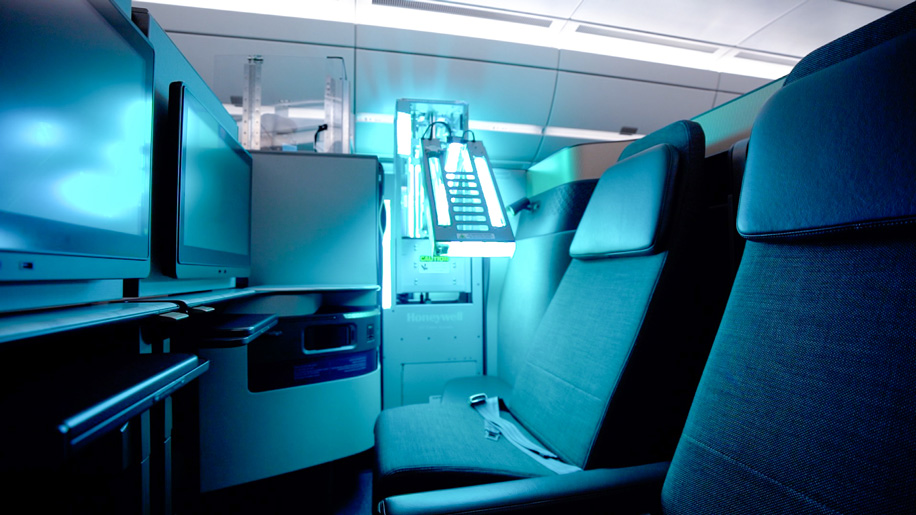Qatar Airways and US-based Delta are turning to futuristic lighting solutions in the fight to keep aircraft clean and customer confidence high. Olivia Palamountain reports
Qatar’s Doha Hamad International airport (HIA) and its national carrier Qatar Airways are renowned for their pioneering efforts to develop the airport and flight experience.
Back in June, Globetrender reported on wearable intelligent technology, robots and temperature screening deployed at HIA as part of new Covid-19-fighting measures.
Now, Qatar Airways will be the first global carrier to operate Honeywell’s Ultraviolet (UV) Cabin System, employed as an additional step after manual disinfection with cleaning products recommended by the International Air Transport Association (IATA) and the World Health Organization (WHO).
UV light has been proven to be effective in deactivating various viruses and bacteria when properly applied, and can treat aircraft seats, surfaces and cabins without using harsh cleaning chemicals.
Honeywell Aerospace president EMEAI, James Currier, says: “Honeywell has technology today that can make air travel safer – from the traveller to the airport worker, throughout the airport and onboard the aircraft.
“We’re working across business lines to develop new products such as Honeywell ThermoRebellion, a new temperature-monitoring solution – Environmental Control System Check, which allows airlines to monitor air flow in the cabin – and an array of personal protective equipment. All this allows for cleaner and safer airports.” The airline’s onboard linen and blankets will continue to be washed, dried and pressed at microbial-lethal temperatures, while its headsets are rigorously sanitised after each flight. These items are then sealed into individual packaging by staff wearing hygienic disposable gloves.
The airline’s onboard linen and blankets will continue to be washed, dried and pressed at microbial-lethal temperatures, while its headsets are rigorously sanitised after each flight. These items are then sealed into individual packaging by staff wearing hygienic disposable gloves.
Qatar Airways group chief executive, Akbar Al Baker, says: “We are pleased to be the first global airline to operate the Honeywell UV Cabin System onboard our aircraft. In clinical tests, UV light has been shown to be capable of inactivating various viruses and bacteria when properly applied at specified doses.

“During these unprecedented times, the health and safety of our crew and passengers continues to be of the utmost importance. Since the start of the pandemic, we have been regularly introducing new and effective safety and hygiene measures onboard our aircraft, based on our unparalleled expertise of flying consistently throughout.”
In July, Qatar Airways further increased its health and safety measures onboard by introducing new personal protective equipment (PPE) for customers and cabin crew. This included face shields for all passengers, and a disposable protective gown for cabin crew, which is fitted over their uniforms, in addition to safety glasses, gloves and a mask.
More high-tech innovations are in place at HIA, such as fully autonomous robots emitting a concentrated UV-C light to eliminate the majority of infectious microorganisms. The machines are deployed in “vulnerable high passenger flow areas to reduce the spread of pathogens”.
In addition, stringent cleaning procedures and social distancing measures have been applied throughout the terminals. All passenger touchpoints are sanitised every ten to 15 minutes and every boarding gate and bus gate counter is cleaned after each flight. Hand sanitiser is provided at immigration and security screening points.
The Oryx Airport Hotel at HIA has also implemented UV-C light to monitor and ensure a thorough cleaning process across all rooms, using a pen only visible under UV light to mark frequent touchpoints.
Delta is joining Qatar Airways in its fight against the virus with the use of the first Vyv (pronounced “vive” – formerly known as Vital Vio) antimicrobial LED lighting deployed above high-touch areas in the onboard toilets – think lavatory sinks, seats and countertops.
The light continually reduces the growth of bacteria within the toilet cubicle and adds an additional layer of antimicrobial protection to enhance cleanliness.
Installation begins this month and will be rolled out across the Delta B757-200 fleet until early 2021.
“Innovation is central to everything we do at Delta. Our partnership with Vyv shows how we are adapting the vision we showcased at CES to double-down on our commitment to customer health and safety,” says Lentsch, chief customer experience officer.
“This technology will provide another of the many layers we’ve put in place that, when working together, keep customers safe. For Delta, there’s no more important goal for applied innovation,” he says.
What’s coming next? Trend reports available to download HERE




